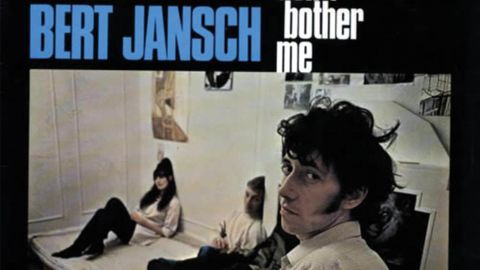Sanctuary’s extensive and sympathetic restoration of the early catalogue of the folk frontiersman continues apace. These three albums date from Jansch’s fertile mid-1960s period at the seminal Transatlantic label and are eminently ready for reevaluation.
It Don’t Bother Me, from just before Christmas 1965, was a swift sequel to the self-titled set. Where Transatlantic had paid a reported £100 for those debut masters, they released the sophomore recordings as their own proud priority. The album is a reminder of both the warm and confessional vocal style possessed by Jansch, then still only 22, as well as the Scotsman’s celebrated acoustic guitar sorcery.
It’s hard to believe these recordings are approaching 50.
In fact, as he intones Oh, My Babe, the title track and others, in that unique voice that nevertheless later found a certain echo in the work of Roy Harper, it’s hard to believe that these recordings are approaching their 50th birthday, so modern-day is their demeanour. Amid the gentle sentiments, there’s also no mistaking the pressing message of Anti Apartheid. The album also includes the banjo piece 900 Miles and Lucky Thirteen, a first teaming with John Renbourn that previewed the full collaboration that arrived the following summer.
Bert And John is a fascinating combination of two very different acoustic styles that dovetailed beautifully, on what can be seen as a prototype for the duo’s formation of The Pentangle a year later. The largely acoustic double-header is mostly jointly composed, with production by Bill Leader, but nods towards jazzier inflections in their reading of Charlie Mingus’ Goodbye Pork Pie Hat.
Remarkably, Jansch was able to spend the early summer of 1966 not only recording that joint venture, but making his next solo album, released at the exact same time and with Renbourn often lending support. Jack Orion got straight down to business with the exhilarating commotion of The Waggoner’s Lad, with Bert on banjo and John on guitar, before a brief The First Time Ever I Saw Your Face (Bert’s own tune, not Ewan MacColl’s). The fundamental difference between this album and the other two was that Jack Orion was the sound of Jansch reshaping history to his style on risk-taking remakes of traditional folk texts, rather than his own material. Highlights include the near- 10-minute title track and versions of Blackwaterside and Pretty Polly. There was one more solo album to come, 1967’s Nicola, before the Pentangle was added to his career diagram. What shines through is a 21st-century relevance in Jansch’s music that most contemporary acoustic artists can only aspire to.


